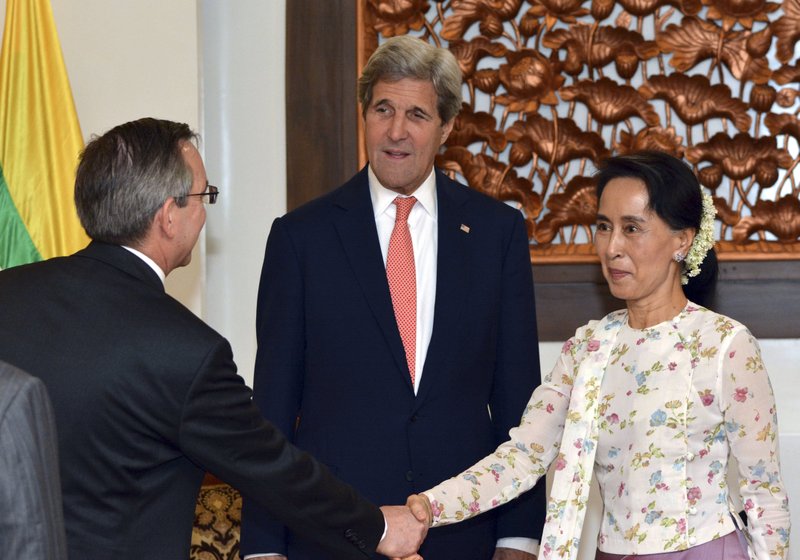NAYPYITAW, Burma -- Secretary of State John Kerry on Sunday urged Burma's new civilian-led government to complete the Southeast Asian nation's transition to democracy by implementing further overhauls to enshrine free markets, development and human rights.
Speaking with Burma's foreign minister and de facto leader, Aung San Suu Kyi, after talks in the capital of Naypyitaw, Kerry pledged continuing U.S. support for the country and hailed progress it has made since Suu Kyi's political party took office in late March after winning elections that ended decades of military control.
"We strongly support the democratic transition that is taking place here," Kerry said.
His visit came less than a week after the Obama administration lifted sanctions against 10 state-run companies and banks in a sweeping modification of penalties imposed while Burma was under military rule. The administration, however, left in place restrictions on trade and investment with the nation's still-powerful military. The changes are intended to spur more U.S. investment and support economic growth under the new government, but also to encourage more overhauls.
The U.S. waived its longstanding bans on investment and trade in 2012 after Burma began political and economic overhauls, but retained restrictions on dozens of companies and individuals designated by the Treasury's Office of Foreign Assets Control because they oppose such overhauls or are implicated in human-rights abuses and military trade with North Korea. In addition, the U.S. continues to ban the import of jade and rubies from Burma.
"The key to the lifting of the [remaining] sanctions is really the progress that is made within Myanmar in continuing to move down the road of democratization," Kerry said, adding, "It is very difficult to complete that journey, in fact impossible to complete that journey, with the current constitution."
Burma is often called Myanmar, a name adopted after the military took power in 1989. Opponents have refused to adopt the name change, as have the U.S. and the United Kingdom.
Kerry called for the charter to be revised to fully respect civilian authority and clearly spell out a separation of powers among various branches of government as well as protect minority-group rights and promote inclusiveness. He said he raised those issues with the commander in chief of Burma's military before departing later Sunday to join President Barack Obama on a visit to Vietnam.
Suu Kyi said she did not believe the remaining sanctions would stay in place for long, but did not look at them as a punishment.
"We're not afraid of sanctions, we're not afraid of scrutiny," she said. "The time will come soon that the United States will know that this is no longer the time for sanctions."
A Section on 05/23/2016
